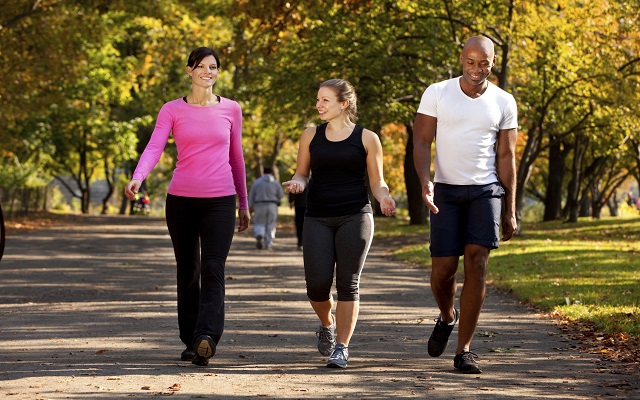It shouldn’t be surprising that walking is good for you, but can it really help you age more gracefully?
Growing evidence suggests that by walking as little as 30 minutes every day, most days of week, you can gain a range of mental and physical health benefits. In fact, you could even end up improving your quality of life and living longer.
A look at the science offers six reasons to walk a little more:
Reason to Walk #1: Live Nearly a Decade Longer
One study conducted by researchers from Brigham and Women’s Hospital in Boston found that more leisurely time physical activity was associated with longer life expectancy (1).
The study found that those who completed 150 minutes of walking per week lived 3.4 years longer and those at a healthy weight gained 7.2 years when compared to sedentary obese people. In addition, those who spent 450 minutes walking per week gained 4.5 years of life expectancy.
Reason to Walk #2: Keep Weight off More Easily
Researches at Harvard University and Brigham and Women’s Hospital in Boston also found that walking can have a significant effect on weight maintenance. The researchers followed more than 34,000 women at normal weight for over 13 years and found that those who walked for about an hour a day were able to successfully maintain their weight (2).
Reason to Walk #3: Boost Your Brain Health
Exercise is one of the best ways to protect your brain against the onset of memory and cognitive issues with age (3). Researchers at the University of Pittsburgh found that walking more is associated with greater amounts of grey matter in the brain (4). The larger volume of grey matter is generally in the areas of the brain that control reasoning and memory. It’s yet another sign that walking is good for brain health.
Reason to Walk #4: Manage Blood Sugar and Blood Pressure
Regular walking, especially following a meal, can increase your body’s insulin sensitivity and help with managing your blood sugar levels (5). Several studies have also found that walking can lower blood pressure and decrease the risk of cardiovascular disease (6-7).
Reason to Walk #5: Have Fewer Sick Days
Regular walking has been shown to improve overall immune function, which can be quite an attractive benefit during cold and flu season.
A study published in the British Journal of Sports Medicine found that adults who performed regular physical activity most days of the week were able to reduce their number of sick days by 43 percent (8). The study also found that the more physically active people of the study were ill for fewer days, with the most active of the group having 46 percent fewer days with colds.
Reason to Walk #6: Be Happier
One of the most immediately noticeable benefits from walking is a significant improvement in mood. Next time you have a bad day, instead of treating yourself to a glass of wine on the couch, try going for a walk outside. It’s likely that it will put you in a better mood.
One study published in the Journal of Psychiatric Research found that adults with symptoms of depression who walked for approximately 30-45 minutes per day across 12 weeks showed obvious improvements when medication alone did not help (9). Another study published in Ecopsychology showed that people that walked in groups outdoors were associated with significantly lower perceived stress and enhanced mental wellbeing (10).
An Easy, Healthy Habit
Walking is one of the simplest and cheapest activities you can do that can be worked into just about any routine. Here are a few simple tips to make your new walking habit that much easier:
- Keep a pair of sneakers in your car or at your office so you’re able to squeeze a longer walk into the day.
- Try to make a habit of avoiding escalators and moving walkways, opting instead to use the stairs or walking a little further.
- Set a timer on your phone that reminds you to take a quick walk every hour or two.
Remember, these simple changes to your daily routine will not only improve your physical health, but you might also find that you’ll likely increase your productivity and enjoy life a little more. There should be no reason not to do something that takes such little effort.
References
- Moore SC, Patel AV, Matthews CE, Berrington de Gonzalez A, Park Y, Katki HA, et al. (2012) Leisure Time Physical Activity of Moderate to Vigorous Intensity and Mortality: A Large Pooled Cohort Analysis. PLoS Med 9(11): e1001335. doi:10.1371/journal.pmed.1001335
- Lee I, Djoussé L, Sesso HD, Wang L, Buring JE. Physical Activity and Weight Gain Prevention. JAMA. 2010;303(12):1173-1179. doi:10.1001/jama.2010.312.
- Ravaglia G, Forti P, Lucicesare A, Pisacane N, Rietti E, Bianchin M, Dalmonte E. Physical activity and dementia risk in the elderly: findings from a prospective Italian study. Neurology. 2008 May 6;70(19 Pt 2):1786-94. Epub 2007 Dec 19.
- K.I. Erickson, C.A. Raji, O.L. Lopez, J.T. Becker, C. Rosano, A.B. Newman, H.M. Gach, P.M. Thompson, A.J. Ho, and L.H. Kuller. Physical activity predicts gray matter volume in late adulthood. Neurology. October 19, 2010 vol. 75 no. 16 1415-1422. doi: http://dx.doi.org/10.1212/WNL.0b013e3181f88359
- Manohar C, Levine JA, Nandy DK, Saad A, Man CD, McCrady-Spitzer SK, Basu R, Cobelli C, Carter RE, Basu A, Kudva YC. The Effect of Walking on Postprandial Glycemic Excursion in Patients With Type 1 Diabetes and Healthy People. Diabetes Care Aug 2012, DC_112381; DOI: 10.2337/dc11-2381
- Moreau KL, Degarmo R, Langley J, McMahon C, Howley ET, Bassett DR Jr, Thompson DL. Increasing daily walking lowers blood pressure in postmenopausal women. Med Sci Sports Exerc. 2001 Nov;33(11):1825-31.
- Murtagh, E. M., Murphy, M. H., & Boone-Heinonen, J. (2010). Walking – the first steps in cardiovascular disease prevention. Current Opinion in Cardiology, 25(5), 490–496. http://doi.org/10.1097/HCO.0b013e32833ce972
- BMJ-British Medical Journal. (2010, November 2). Physical fitness curbs frequency and severity of colds, study finds. ScienceDaily. Retrieved June 27, 2016 from www.sciencedaily.com/releases/2010/11/101101191545.htm
- Mota-Pereira J, Silverio J, Carvalho S, Ribeiro JC, Fonte D, Ramos J. Moderate exercise improves depression parameters in treatment-resistant patients with major depressive disorder. Journal of Psychiatric Research , Volume 45 , Issue 8 , 1005 – 1011
- Marselle MR, Irvine KN, Warber SL. Examining Group Walks in Nature and Multiple Aspects of Well-Being: A Large-Scale Study. Ecopsychology. September 2014, 6(3): 134-147. doi:10.1089/eco.2014.0027.





